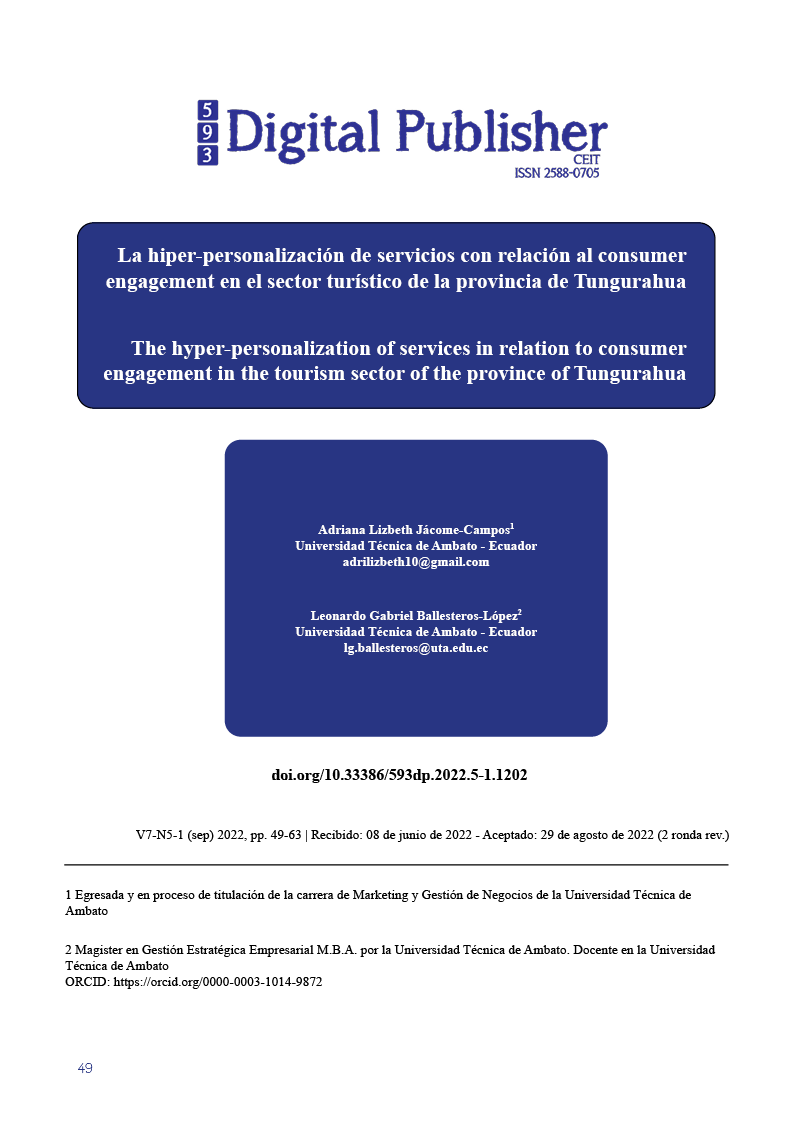The hyper-personalization of services in relation to consumer engagement in the tourism sector of the province of Tungurahua
Main Article Content
Abstract
The innovation of services in the tourism sector in a personalized way was considered unnecessary, since the cost was not considered an investment. As a result, companies could lose 38% of their potential customers by not providing personalized experiences. The objective of the study is to evaluate the level of application of hyper-personalization of services in relation to consumer engagement in the tourism sector in the province of Tungurahua. The methodology used was quantitative, since it allowed the collection of information through a validated instrument. The study sample was 347 people cataloged by the Economically Active Population (PEA). The result showed that the relationships model predicts a positive relationship between hyper-personalization and consumer engagement. It is concluded that customers are part of the creation of innovative services, being integrated as active partners of the company.
Downloads
Article Details

This work is licensed under a Creative Commons Attribution-NonCommercial-ShareAlike 4.0 International License.
1. Derechos de autor
Las obras que se publican en 593 Digital Publisher CEIT están sujetas a los siguientes términos:
1.1. 593 Digital Publisher CEIT, conserva los derechos patrimoniales (copyright) de las obras publicadas, favorece y permite la reutilización de las mismas bajo la licencia Licencia Creative Commons 4.0 de Reconocimiento-NoComercial-CompartirIgual 4.0, por lo cual se pueden copiar, usar, difundir, transmitir y exponer públicamente, siempre que:
1.1.a. Se cite la autoría y fuente original de su publicación (revista, editorial, URL).
1.1.b. No se usen para fines comerciales u onerosos.
1.1.c. Se mencione la existencia y especificaciones de esta licencia de uso.
References
Ajay, N., Tarum, K., & Dishank, J. (2021). Hyper-personalization in financial services.
Arroyo, J. C. (2016). Co-creación y nuevos modelos de negocios en contextos emergentes. Invenio, 19(37), 47–56.
Bansal, R., & Pruthi, N. (2021). Emerging technologies and digital customer engagement : emerging technologies and digital customer engagement : recent trendS. August.
Brodie, R. J., Ilic, A., Juric, B., & Hollebeek, L. (2013). Consumer engagement in a virtual brand community: An exploratory analysis. Journal of Business Research, 66(1), 105–114. https://doi.org/10.1016/j.jbusres.2011.07.029
Busalim, A. H., Che Hussin, A. R., & Iahad, N. A. (2019). Factors Influencing Customer Engagement in Social Commerce Websites: A Systematic Literature Review. Journal of Theoretical and Applied Electronic Commerce Research, 14(2), 0–0. https://doi.org/10.4067/s0718-18762019000200102
Castañeda, R. (2016). La innovación de productos y servicios: una reflexión axioteleológica. IIESCA, 78–83. http://redip.bqto.unexpo.edu.ve
de Roys, S., Xuereb, J.-M., Bouchard, A., Viniane, C., Sehad, M., Pellegrinelli, R., & Mantz, B. (2016). Hyper-personalization vs . Segmentation : Has Big Data made customer segmentation redundant ? In Capgemini Consulting and ESSEC Business School. https://www.capgemini.com/consulting-fr/wp-content/uploads/sites/31/2017/08/hyperpersonnalisation_vs_segmentation_english_05-01-2017.pdf
Delfín Pozos, F. L., & Acosta Márquez, M. P. (2016). Analysis and relevance in business development. Revista Científica Pensamiento y Gestión, 40, 184–202. https://doi.org/10.14482/pege.40.8810
Dessart, L., Veloutsou, C., & Morgan-Thomas, A. (2016). Capturing consumer engagement: duality, dimensionality and measurement. Journal of Marketing Management, 32(5–6), 399–426. https://doi.org/10.1080/0267257X.2015.1130738
DOCTMS. (2018). Hyper-Personalization.
Dulanto Jo, D. E. (2017). Co-creación con los consumidores: estrategia de marketing para la creación de valor en el contexto del desarrollo de nuevos productos y servicios. In Universidad de Piura. https://pirhua.udep.edu.pe/handle/11042/3028
Fernández, L. (2014). El comportamiento del consumidor online. Factores de Ewom en el sector turistico. In Tesis de Master en Administracion y Direccion de Empresas. https://dialnet.unirioja.es/servlet/extart?codigo=2779743
Gonzalez, A. (2015). La innovación en el servicio al cliente. La Innovación En El Servicio Al Cliente, 1–16. https://doi.org/10.15332/tg.pre.2020.00177
González, E. (2019). La experiencia de cliente. In Universidad Pontificia Comillas. https://repositorio.comillas.edu/xmlui/bitstream/handle/11531/27262/TFG - Gonzalez Ramos%2C Elisa.pdf?sequence=1&isAllowed=y
Guadarrama Tavira, E., & Rosales Estrada, E. M. (2015). Marketing relacional: Valor, satisfacción, lealtad y retención del cliente. In Red de Revistas Científicas de América Latina, el Caribe, España y Portugal (Vol. 40, Issue Marketing relacional: valor, satisfacción, lealtad y retención del cliente. Análisis y reflexión teórica). https://www.redalyc.org/pdf/870/87041161004.pdf
Harrigan, P., Evers, U., Miles, M., & Daly, T. (2017). Customer engagement with tourism social media brands. Tourism Management, 59, 597–609. https://doi.org/10.1016/j.tourman.2016.09.015
Hernández-Sampieri, R., Fernández-Collado, C., & Lucio, P. B. (2014). Metodología de la Investigación. In M. Toledo (Ed.), Animal Genetics (Sexta). McGraw Hill.
Herrera, L., & Hidalgo, A. (2019). Dinamica De La Innovación En Servicios Rafael Herrera. Contaduria y Administracion, 64(1), 1–20.
Huilcapi Masacon, M., Castro López, G., & Jácome Lára, G. (2017). Motivación: las teorías y su relación en el ámbito empresarial. Revista Cientifica Dominio de Las Ciencias, 3(2), 311–333.
Jain, G., Paul, J., & Shrivastava, A. (2021a). Hyper-personalization, co-creation, digital clienteling and transformation. Journal of Business Research, 124(April 2020), 12–23. https://doi.org/10.1016/j.jbusres.2020.11.034
Jain, G., Paul, J., & Shrivastava, A. (2021b). Hyper-personalization, co-creation, digital clienteling and transformation. Journal of Business Research, 124(January), 12–23. https://doi.org/10.1016/j.jbusres.2020.11.034
Koot, J. (2016). Customer engagement. Australian Journal of Pharmacy, 97(1147), 35. https://doi.org/10.1177/1094670511411703
Mahler, P., Masket, J., & Walker, B. (2020). Retail Hyperpersonalization Creepy versus Coo.
Martínez, R., & Camacaro, M. (2015). La participación del cliente en la medición de la productividad de las PYMES de servicios. Redip. Unexpo. Vrb, 5(4), 995–1013. http://redip.bqto.unexpo.edu.ve
Organizacion Mundial de Turismo. (2020). Covid - 19 y turismo 2020: análisis del año.
Qiu, L., Chen, X., & Lee, T. J. (2021). How can the celebrity endorsement effect help consumer engagement? A case of promoting tourism products through live streaming. Sustainability (Switzerland), 13(15). https://doi.org/10.3390/su13158655
Richrelevance, A. (2020). Hyper-Personalization : The Pinnacle of Personalization for Marketers.
Rodríguez, L. (2017). La Teoría De Acción Razonada : Implicaciones Para El Estudio De Las Actitudes. Investigación Educativa Duranguense, 7, 66–77.
Shariff, F., Dulay, S., Ahuja, M., Ivic, S., Dalmia, N., & Ebrahim, S. (2020). Connecting with meaning: Hyper-personalizing the customer experience. Delloite, 1–30.
Shukla, P. S., & Nigam, P. V. (2018). E-Shopping using Mobile Apps and the Emerging Consumer in the Digital Age of Retail Hyper personalization: An Insight. Pacific Business Review International, 10(10), 131–139. http://yourstory.com/2016/03/indian-e_commerce-
Sodhi, A. (2018). Hyper-Personalization : a Marketing Primer for Enhanced Customer Experience.
Velásquez, D. (2020). Aportes de la co-creación para la innovación y las relaciones con clientes. Suma de Negocios, 11(24), 84–97. https://doi.org/10.14349/sumneg/2020.v11.n24.a9
Vivek, S., Beatty, S., & Morgan, R. (2015). Customer engagement: exploring customer relationships beyond purchase. Journal of Marketing Theory and Practice, 14(4), 301–314. https://doi.org/10.2753/MTP
Xerox. (2020). Hyper-personalized Marketing.



